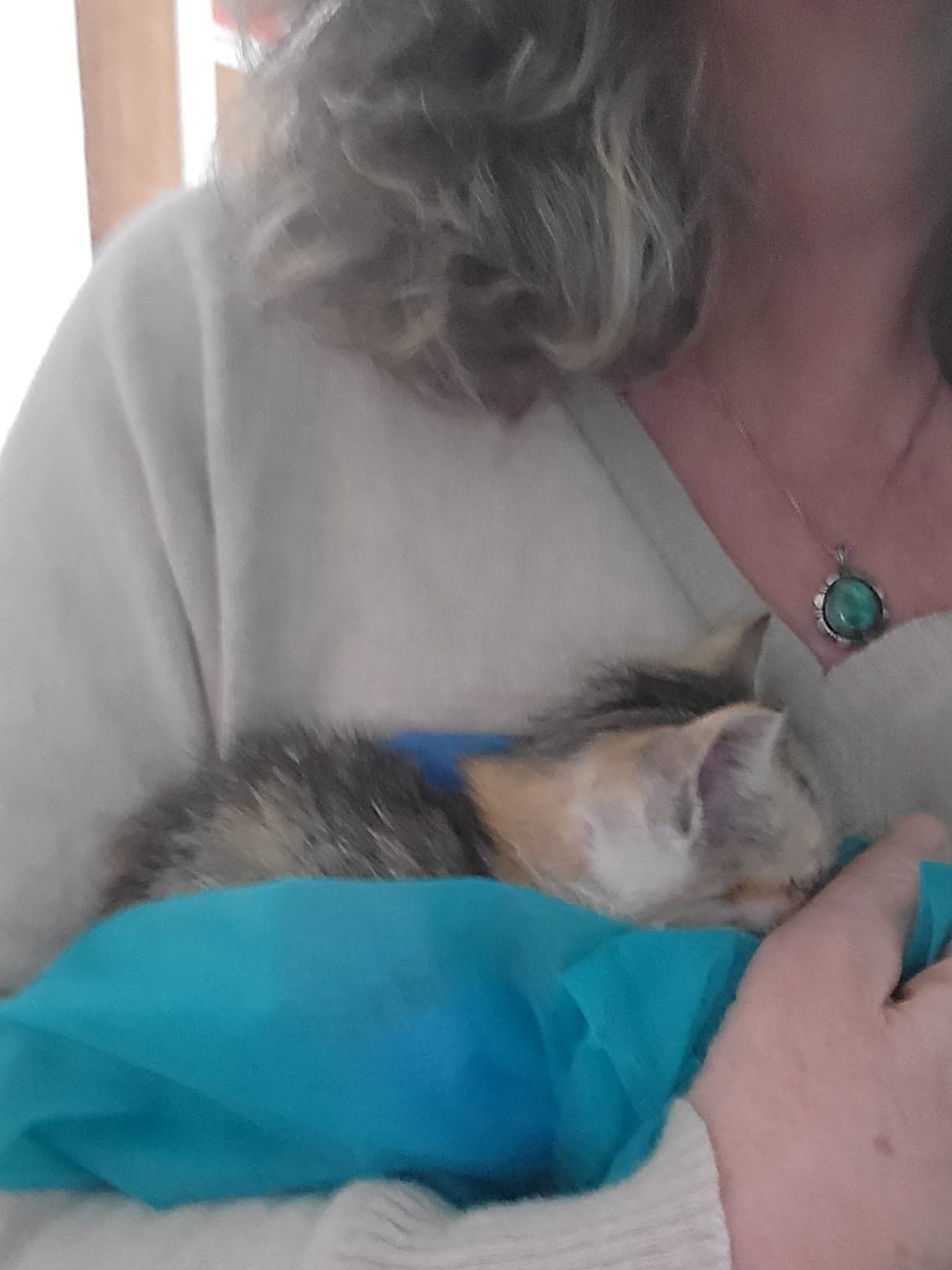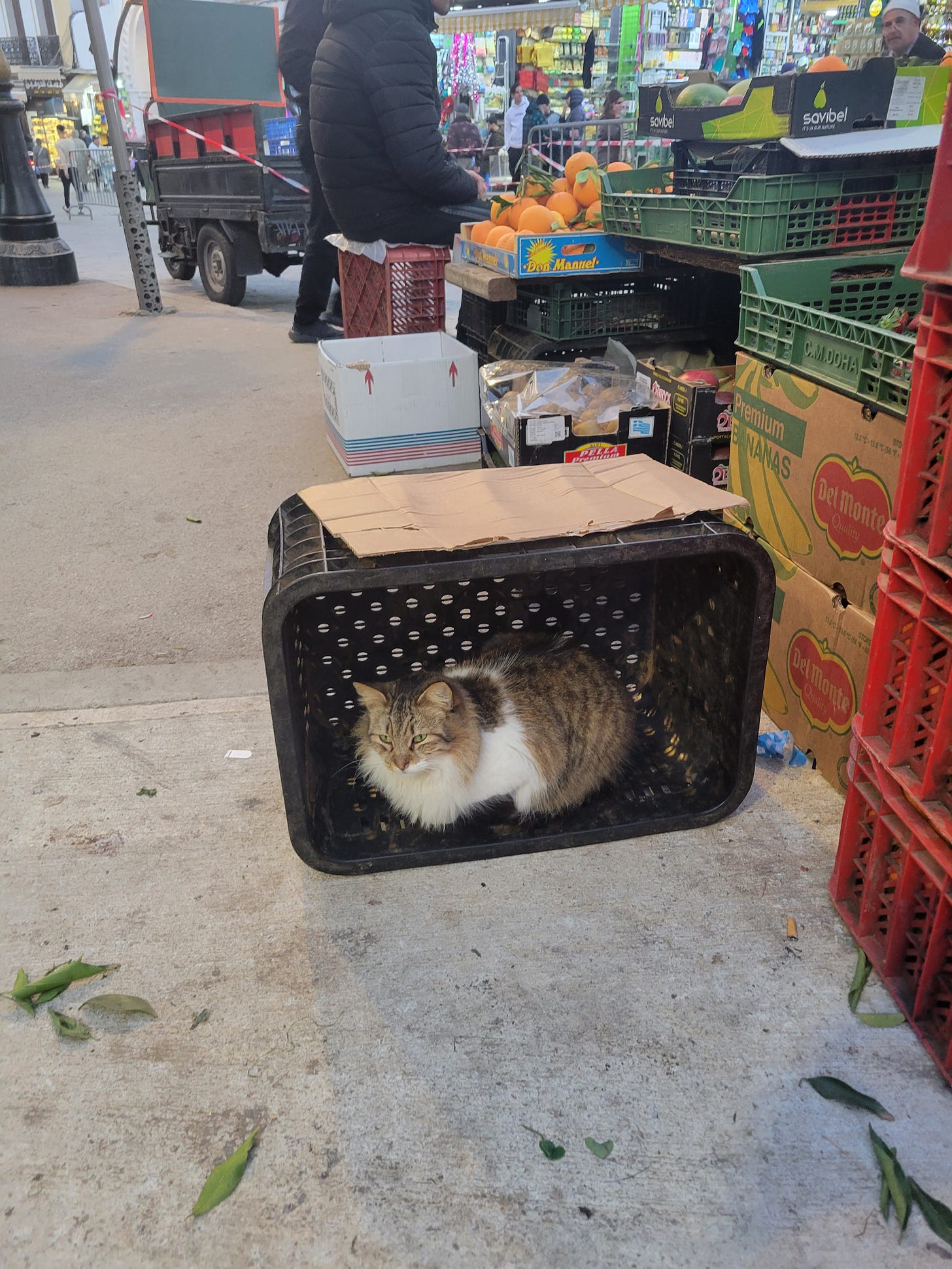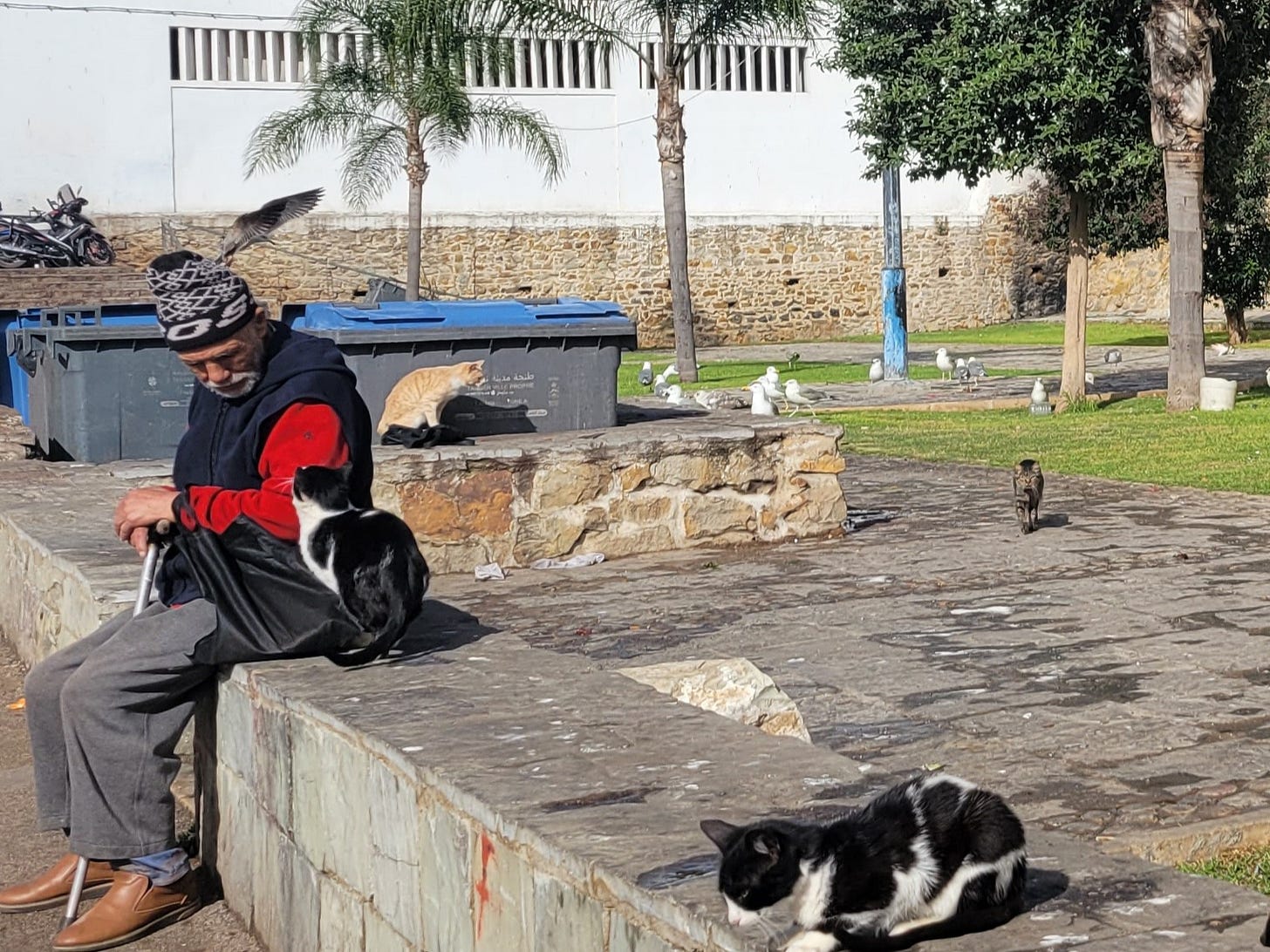My little friend.
This is a street kitten I saved when I was new to Tangier
We had three days together; she kneaded my sweater when I took her to the clinic.
She died in my arms.
I named her Habbibi and buried her in the Medina under the tree that overlooks the sea.
This is the full story, with an explanation of the the street cat culture in Tangier.
Habbibi is my favorite Arabic word. It means loved one or lover or ‘bro’ or bestie and maybe a mix.
I named the kitten in my arms Habbibi. I found her walking and crying in the middle of a busy winding street. I put my hand out to stop a car and picked her up.
But I need to explain something before going on. The cat situation here is something I have never encountered before and has taken some time to understand.
Cats live in the street.
They are everywhere in the city. About 80 percent seem healthy and about 20 percent very ill or injured.
It is the way.
People feed them and care for them, both shop owners and regular people. Humane societies neuter and spay them but of course only some.
You see cat food and cat poop in the Medina on the cobblestone streets. Each morning it is washed clean and each night it returns.
There are places where momma cats have kittens and raise them. They sleep on scooters and on pillows and on cars and in parks. It is just the way.
Every day you see healthy happy cats and cats that need help. You cannot help all of them. You have to just accept and maybe feed some and realize it is the way.
Back to Habbibi:
I picked her up after stopping the car, and saw there was nowhere to put her that was safe. Too many cars and roads.
So I walked around looking for her cat momma and could not find her.
What to do? Habbibi had weepy eyes but was purring and kneading my sweater with a lot of life.
I asked some people what to do and one pointed to where there were more cats. I walked there and found no momma cat.
I walked to a store owner who speaks English and asked what to do. He said the best thing is to leave a kitten out for momma to find it. They can find each other through smell.
Also he told me where to find a free clinic.
So I walked 20 minutes with little Habbibi kneading and purring on my sweater to the clinic.
I passed a row of welders which was loud and smokey with sparks flying and tried to protect her.
The clinic was closed.
I walked back and talked to my store owner friend. He said my kitten needed her eyes wiped. The cats’ eyes get gooey because of the sea wind, he said.
The neighboring store owned made a solution and wiped her eyes.
I was torn...I didn’t want to leave her out all night but I felt it was the best option. Plus I had a room in a hostel and nowhere to keep her anyway.
So I left little Habbibi near other cats in quiet-ish area, hoping for the best. I thought she might not be able to eat regular food and needed milk.
Day 2. I walked out to the spot and looked for her. Not there.
I walked to the clinic but it was closed again! Not open until the next day.
Later that day I saw her! Far away from the previous spot and near a little convenience shop where I often bought eggs and bread.
I bought some wet cat food and cheese that was recommended by the local shopkeeper and tried to feed little Habbibi but she wouldn’t eat.
Again with sore heart I left her to try to find her mother.
Day 3. She was not in the place I left her. I couldn’t find her.
I walked to the free clinic and it was open and I finally talked to a vet! He said to get some special food from an actual vet (they didn’t have food) and gave me a number.
Some time later I saw her again! This time in the middle of a busy pedestrian street with tourists staring.
The poor thing was vomiting. I immediately went to a shop owner and asked for a sack for the little kitty. I picked her up with the sack as cover and walked back to the free clinic.
The blue you see in the photo is that sack.
We walked by the forgers again, this time I walked around them which was difficult due to fast moving cars.
The vet was there and spoke to me in French. He said she was sick and not much to do. I could go to an actual vet and get special food and keep her warm. It might work.
We walked home and Habbibi still kneaded my sweater and purred.
I got back to the hostel asked my friend who works there, Mohammed, to help me call the vet since I only can us WhatsApp, no local phone number.
They were closed for another 2 hours!
So I sat at the hostel with Habbibi and two other guests petted her and a guy from Syria carefully washed her eyes and held her.
Mohammed said Habbibi could stay in the reception area while I went to the vet because it was warm with a heater on. I left her there in a box and took a taxi to the vet.
(I didn’t want to try to take a kitten in a box in a taxi for many reasons).
I got the food at the vet and took a taxi back. When I walked into the hostel Mohammed said “Nancy come quick, she is dying!”
Little Habbibi had been sleeping but was having some convulsions, so I held her in my arms while she died and spoke soft words to her.
I lit a candle and some frankincense incense and let her lie quietly for six hours. I remembered the huge and beautiful tree that is in a square overlooking the sea.
And I went out near midnight and buried her there.
In the next days I was stopped in the street. Shop owners and people who had seen me carrying her asked how she was doing. Also the workers in the hostel asked about her.
Even a couple of weeks later, people who had seen us would ask me about her. They cared as if she were part of the community.
And that is what I learned.
The street cats are part of the community, and I was part of the community.







I have cared for hundreds of street cats since making Egypt my base. Some you can give improved health and strength to survive street life, but I have also lost many, especially orphan kittens, that I was not able to help soon enough or that had problems from birth.
Some survived but with only one eye due to infections that had already gone too far. Many more went on to lead long lives in the streets, often cared for by others who noticed my examples of care.
Your kindness gave this little one at least an end to life where there was love, and that is sometimes the best we can do for them.